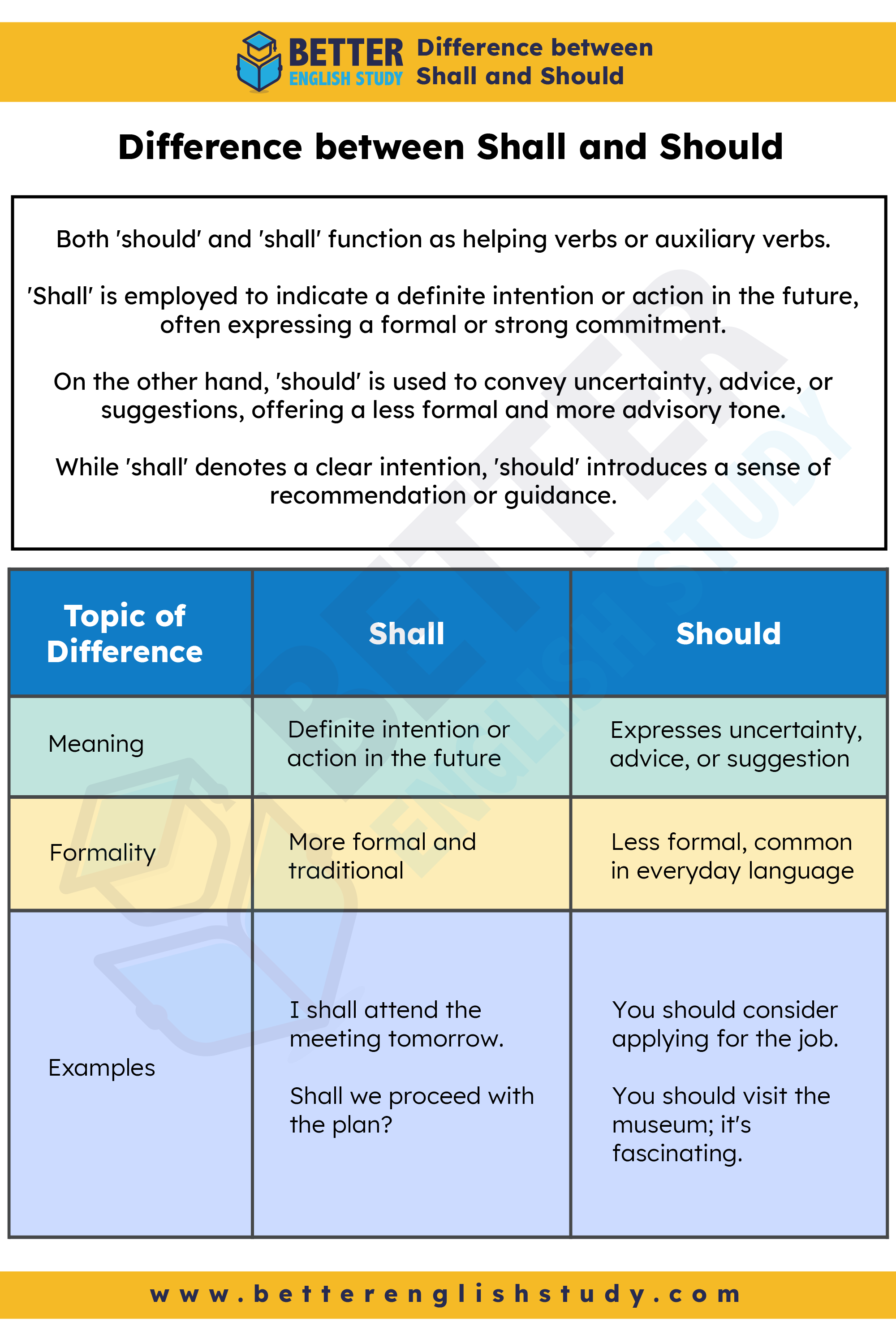
In the intricate tapestry of English grammar, the choice between ‘shall’ and ‘should’ can be a linguistic labyrinth for learners. These two modal verbs, while seemingly similar, carry distinct nuances that can significantly alter the tone and intention of a sentence.
As we embark on this exploration, we will unravel the differences between ‘shall’ and ‘should,’ shedding light on when to use each and providing examples to guide learners through their proper application.
Difference between Shall and Should
Both ‘should’ and ‘shall’ function as helping verbs or auxiliary verbs. ‘Shall’ is employed to indicate a definite intention or action in the future, often expressing a formal or strong commitment.
On the other hand, ‘should’ is used to convey uncertainty, advice, or suggestions, offering a less formal and more advisory tone. While ‘shall’ denotes a clear intention, ‘should’ introduces a sense of recommendation or guidance.
For an overview of the relation, let’s explore the table.
| Topic of Difference | Shall | Should |
| Meaning | Definite intention or action in the future | Expresses uncertainty, advice, or suggestion |
| Formality | More formal and traditional | Less formal, common in everyday language |
| Examples | I shall attend the meeting tomorrow. Shall we proceed with the plan? | You should consider applying for the job. You should visit the museum; it’s fascinating. |
Shall or Should – When to Use
Understanding the appropriate use of ‘shall’ and ‘should’ is crucial for effective communication. Let’s explore scenarios where each is aptly employed.
1. Definite Intention in the Future
- Shall: I shall complete the project by Friday.
Here, ‘shall’ is used to express a firm intention to complete the project in the future.
- Should: You should submit your application before the deadline.
‘Should’ suggests advice or a recommendation regarding the submission of the application.
2. Formality and Tradition
- Shall: Shall I accompany you to the event?
‘Shall’ is considered more formal and traditional, suitable for polite inquiries.
- Should: Should we grab a coffee sometime?
‘Should’ is less formal and fits well in casual settings, especially when making suggestions.
3. Interchangeability with ‘Will’
- Shall: I shall call you later. (Interchangeable with ‘I will’)
‘Shall’ can be replaced with ‘will’ without altering the meaning.
- Should: You should take some rest. (Not interchangeable with ‘You will’)
‘Should’ cannot be substituted with ‘will’ in this context.

Shall I or Should I? – Is Using Shall Polite?
The choice between ‘shall’ and ‘should’ in questions often revolves around formality and politeness:
Shall I:
A more formal and traditional option. “Shall I assist you with your luggage?”
Should I:
Suitable for a polite inquiry in everyday situations. “Should I bring anything to the party?”
Is it correct to say I should be grateful?
Yes, it is correct. Here, ‘should’ is used to express a suggestion or advice, implying that being grateful is a recommended course of action.
Shall or Should in Questions
The decision between ‘shall’ and ‘should’ in question depends on the level of formality:
Shall:
Appropriate for more formal or traditional inquiries. “Shall we proceed with the plan?”
Should:
Fits well in everyday, less formal questioning. “Should I call and confirm the reservation?”
In conclusion, mastering the distinctions between ‘shall’ and ‘should’ is crucial for effective communication in English. By understanding their meanings and contexts, learners can navigate these modal verbs with confidence, enhancing their language proficiency and ensuring accurate expression.
